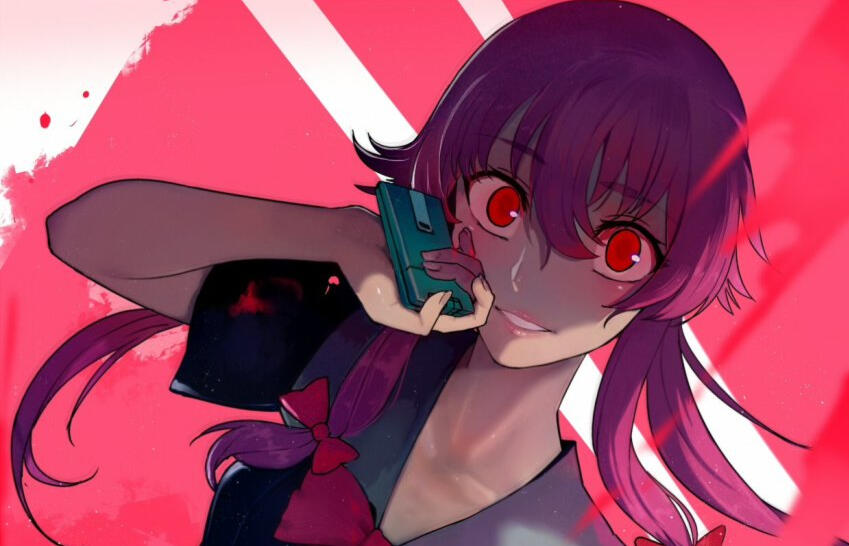
The Yandere Origin in Psychology
Of all the character archtypes lying about out there, Yanderes seem to be the most misunderstood and hated, far more than even the most sadistic variation of tsunderes. Obviously, I can’t judge other people’s preferences on the matter, but I always felt like people are taking Yanderes the wrong way. When most people think of yandere they instantly think of “they will murder you! Nice boat style!” Uuuuuu— I feel bad for them already. After all, they just wanted to be your bestest friend for ever and ever and ever. That boxcutter business? It’s not going to happen unless you cheat on or betray them, and in some cases you might be just a bit deserving of what’s coming… I mean, Makoto (School Days) sure does.
But even then, it’s not quite that simple. I knew that Yanderes (and Yangires for that matter, see their MAL club for word breakdown) were on the extreme ends, but even I didn’t quite understand the issue involved until I read this TIME magazine article on Borderline Personality Disorder. Yeah, psychologists once thought of this as a fatal disease, how’s that for you sick-girl Moe lovers, not to mention all the Damaged Goods and Katawa Shoujo fans.
I’m sure people are going to be too lazy to read an article so heavy on real-world psychology, so I’ll take some exerpts from it.
What is Borderline Personality Disorder
Borderline patients seem to have no internal governor; they are capable of deep love and profound rage almost simultaneously.
It’s also called the Emotionally Unstable Personality Disorder. Their tendencies for depression and self-harms sounds a bit like the popular perception of emo, but there’s a big difference: BPD people can be tremendously joyous also. The articles gives another good one line metaphor of BPD:
Borderline individuals are the psychological equivalent of third-degree-burn patients. They simply have, so to speak, no emotional skin. Even the slightest touch or movement can create immense suffering.
What does it have to do with Yandere
They are powerfully connected to the people close to them and terrified by the possibility of losing them — yet attack those people so unexpectedly that they often ensure the very abandonment they fear.
That’s really the signature trait of a Yandere isn’t it? The complete attachment and devotion they have towards their beloved and best friends, followed by outrageous reactions to any drama in the relationship. Kind of like Kaede’s slave-like total dedication to Tsuchimi Rin, as well as her breakdown moments which scared both him and Asa.
What causes it
Some borderline individuals come from homes where they were abused, some from stifling families in which children were told to go to their room if they had to cry, and some from normal families that buckled under the stress of an economic or health-care crisis and failed to provide kids with adequate validation and emotional coaching. “The child does not learn how to understand, label, regulate or tolerate emotional responses, and instead learns to oscillate between emotional inhibition and extreme emotional lability,”
Bad parenting, it sounds like. Basically a case of ‘this child never learned how to handle emotions’. Sadly, with the social pressure of today’s families, the oftentime lacking of parents, and all this economic recession business, it’s not surprising that BPD patients are on the rise. Yes, that means you’re more likely to meet a Yandere than ever before—

My point in all this? I’m not necessarily trying to get people to like Yanderes, but I do think that Yandere characters are those that needs support (and pity, except that’s not always wanted), not animosity and blame from others.
There also seem to be some kind of confusion that Yanderes hurt their beloved because they enjoy doing so: that’s not Yandere, that’s Sadism, and a Yandere may exhibit sadistic traits but it’s not usually part of their archetype. Yanderes don’t hurt their close companions because it gives them pleasure, it’s just that they physically express emotions — which can be either a really good thing, or a really bad thing.
And frankly, if you were a good partner who took a Yandere’s insecurities to mind, there are actually quite a few joys in the trait. Without the stabby stabby anger, what remains is dedicated love and transparent display of exhilarating joy… now there’s something I actually kind of admire. Don’t get me wrong— only kind of, a bit…
and you are the center of their universe
Well, I guess it depends on the amount of attention you want.